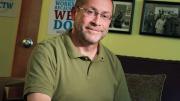Bill Jaeger never meant to become a union organizer: when he arrived at Harvard in 1984, shortly after graduating from Yale with a degree in Russian studies, he planned to work at the Russian Research Center and then go to graduate school. But with workers in his office and across Harvard unionizing,he was drawn in.“I saw some really thoughtful, really impressive people throwing themselves into that,” he says. Jaeger grew up outside St. Louis, where his father was an accountant for McDonnell Douglas. After high school, looking for more diverse geography, he headed to Yale, where he met his wife, Susan Mintz, while singing in the glee club.They now live in Arlington, where he enjoys watching European professional soccer with their two sons and plays recreationally with an over-50 club called the Arlington Pond Dawgz. At Harvard, he gave up on a master’s degree after a semester and joined the unionizing effort full time in 1986. As director, he now represents the Harvard Union of Clerical and Technical Workers’ 4,600 members in negotiations with the University—which can involve as many as 60 to 70 formal meetings a year. This past March, nine months after their con- tract expired, HUCTW and Harvard settled on a new three-year agreement. Jaeger, a careful, measured speaker, says HUCTW makes use of what is known formally as an “interest-based approach,” and the union has never gone on strike. Even so, settling the contract, and pushing forward on talks about health insurance, have made for a “really tough year.” But it was because the agreement was slow to arrive that more of the Harvard community was able to join in a discussion about labor.“That wouldn’t have happened,” he says,“if this had been a quiet, quick, smooth negotiation.”
Bill Jaeger has led unionizing efforts full time since 1986
Bill Jaeger has led unionizing efforts full time since 1986
He has led unionizing efforts full time since 1986.

You might also like
Five Questions with Tien Jiang
How brushing and flossing can protect your heart
Five Questions with Nancy Gibbs and Thomas E. Patterson
The Washington Post laid off more than a third of its journalists. Does this signal a new era for newsrooms?
Harvard’s Epstein Probe Widened
The University investigates ties to donors, following revelations in newly released files.
Most popular
Explore More From Current Issue

A New Landscape Emerges in Allston
The innovative greenery at Harvard’s Science and Engineering Complex

What Bonobos Teach Us About Female Power and Cooperation
A Harvard scientist expands our understanding of our closest living relatives.






